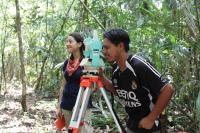Anthropology is a holistic science dedicated to the study of human biological and cultural diversity and evolution. It seeks to understand how people live in and respond to their environments.
Anthropologists integrate methods and theories from across the sciences, arts, and humanities to study the many intriguing facets of humanity across space and time – from the earliest fossil humans to the more recent archaeological record and present-day cultures.
Anthropology includes intersecting subfields:

Archaeology seeks to better understand cultures through investigating things that people leave behind, including artifacts (tools, vessels...), features (hearths, buildings...) and ecofacts (animal bones, plant remains...). |
 Biological anthropology studies human biology and evolution across diverse fields including primatology, paleoanthropology, forensic anthropology, and evolutionary health. It looks at relationships between behavior, ecology & biology. Biological anthropology studies human biology and evolution across diverse fields including primatology, paleoanthropology, forensic anthropology, and evolutionary health. It looks at relationships between behavior, ecology & biology. |

Sociocultural anthropology investigates ways humans organize themselves, cultural practices, belief systems, what constitutes meaning and value, and how material and intellectual resources are allocated both within and across cultures.
|

Linguistic anthropology is the dynamic study of language, addressing topics like language formation and spread, how and why languages change over time, and what happens when multiple languages meet.
|